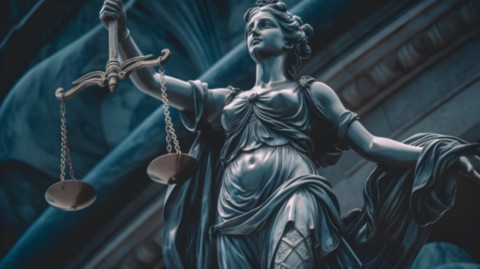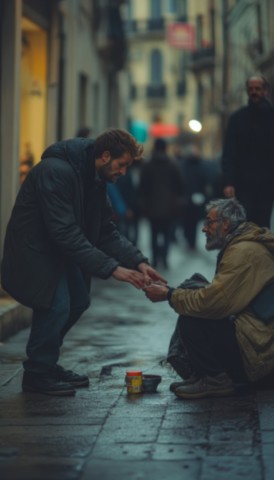John the Baptist: Voice of the voiceless in the desert

In times of uncertainty and change, it is essential to listen to the voice of the prophets, those who, like beacons in the darkness, announce life and guide our path. The voice of the prophets reminds us that, although storms may batter our lives, there is always a course that leads us to fulfillment, for all rivers flow into the sea. The prophet’s obstinate hope, who looks with captivated eyes at the strength of the seed that sprouts and breaks the earth. The prophet points out the grace that grows in the night of wakefulness. It is crucial that we pay attention to these messages, which allow us to discern the direction we should follow.
Among these prophets, John the Baptist stands out, the prophet of Advent. His message resonates strongly in our search for meaning amid the crisis of meaning we face. As we prepare for the arrival of the new, John invites us to open our hearts and recognize the importance of transformation. He not only proclaims repentance but also calls us to envision the light that is approaching, a light that invites us to action and participation.
John is "the voice crying out in the wilderness," a place of exile and banishment, offering a song of life and hope, an echo that resonates in the prophetic line of Isaiah and Ezekiel. The preaching of the Baptist speaks of the return of the banished and exiled, of the expectation of imminent change; he invites us to the transformation of the small and the transfiguration of reality, challenging the agony of power that seemed eternal.
Faced with the question "What should we do?" (Luke 3:12-14), the prophet John answers various groups: first, the expectant crowd, full of longing; second, the publicans, tax collectors; and third, the soldiers, probably Romans, representatives of domination and power. To all of them, John demands the preservation of justice and righteousness, reminding them of the importance of solidarity as God's will, the desire for all creation to live in harmony. It is not about romanticizing poverty or delivering a populist speech to overthrow the tyrant. It is about being attentive to the calls for change, watching the life that pulses, contemplating the signs of a Kingdom that is coming today.
The prophet John does not proclaim himself as the savior; he points to Christ, the liberating Messiah and the signs that His imminent arrival brings. He is not a dreamer dancing on illusions, but a prophet who challenges us to action. Although it seems almost impossible for rain to fall in the desert, or for flowers to bloom from the dry dust of the frozen steppes, the prophet trusts and knows, knows in his heart, that the clouds are about to release the Just One (Cf. Is 45:6-8). The prophet invites us to discover a reality of another possible world.
Urgent Call to Hope
The prophet acts like a magnet that attracts good news, like thunder that rumbles and gathers other clouds, other skies, other winds to come together and drop their dew of redemption. John is certain of the coming of the Messiah, and he continues to show us the right direction. We are called to be "Johns and Baptists," echoing the same voice: "Prepare the way of the Lord, make straight His paths" (Luke 3:4).
Faced with the question "What should we do?" (Luke 3:10-18), John is very clear: practice righteousness, establish solidarity, make hospitality a norm, establish justice and make it concrete. It is vital to remember that, in one way or another, we have all been migrants in the desert at some point, that our parents and grandparents crossed seas and solitudes, went through wars. The history of the Jewish people is, in some way, the history of the salvation of all humanity: slaves and sold, subjected, exiled, migrants, banished, and displaced. Is it really so difficult to see? Can we not understand that, at the end of the day, borders are artificial constructions and that races are mere pretensions designed to establish oppressive systems? Therefore, the prophets remind us of the importance of having a heart of flesh, a human and compassionate heart towards the poor, the widow, the orphan, and the oppressed.


Urgent Call to Rectification
We all have the opportunity to rectify, even the most cruel and nefarious regimes, as suggested by the Gospel text, when the soldiers of the Roman Empire ask what they should do. They do not expect to earn a promised heaven at the cost of faith and prayers because God can raise children of Abraham from the stones. It is about establishing justice and producing good works as a sign of repentance and change: sharing, rejecting all acts of corruption and domination, instituting solidarity, avoiding inequality, and uprooting all iniquity.
Will we be able to listen to the prophet John? Both personally and communally, will we be able to be consistent with these signs that precede the arrival of the kingdom? Because the Advent we live these days is not just a liturgical time; it is every day that "we await the glorious coming of our Savior, Jesus Christ." How do we live this daily Advent?
Urgent Call to Compassion
"I am not worthy to untie His sandals": a phrase from John that surprises. Often interpreted as a sign of humility, for John does not preach himself as the Christ. People think that maybe, just maybe, John the Baptist is the expected Messiah. But John acknowledges that there is another after him who is already coming. And that one, he is not worthy to untie His sandals. This expression also refers to Jewish tradition, where untying sandals symbolizes an act of humility and responsibility towards the most vulnerable.
In Jewish tradition, untying sandals is associated with a man's duty to marry his brother's widow, known as levirate marriage. According to Deuteronomy 25:5-10, if a man dies without leaving offspring, his brother has the obligation to marry the widow to preserve his name and inheritance. If the brother refuses to fulfill this obligation, the widow can remove his sandal as a symbolic act representing his refusal to assume this responsibility. Jesus, on the other hand, chooses to wear the sandal.
In the context of Luke's Gospel, when John the Baptist says he is not worthy to untie Jesus' sandals, he expresses his deep humility and recognition of Jesus' greatness. In John's Gospel, for example, Jesus removes His cloak during the last supper and washes His disciples' feet as a symbol of service and meekness, and also as a symbol of authority through humble and fraternal service.
Jesus, the Messiah, is the elder brother who has come to wed fragile and abandoned humanity, the poor widow who represents vulnerable societies, the abandoned and excluded majorities living on the periphery. Will we be able to grasp this message? Will we be able to proclaim the depth of this message of change and righteousness out loud?

